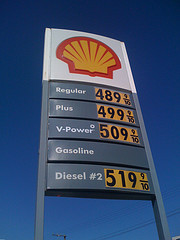California Relaxes Smog Controls In Effort To Bring Down Gas Prices Image courtesy of (Schill)

(Schill)
Since winter-blend gas — which normally isn’t available until after Oct. 31 — can be produced faster than the summer blend, it’s hoped that refineries would flood the market with gas, bringing the retail price down for consumers.
Winter-blend gasoline is also $.15-.20 less expensive than summer blend, and refineries say it is will be easy to switch over to the cheaper blend.
Governor Brown says the impact of making the early switch to winter-blend gas on the state’s air quality will be “negligible.”
While the refineries may begin pumping out winter-blend gas soon, some industry analysts say it may not make it to market right away, especially at gas stations who aren’t getting their product directly from refineries.
“The majors have product,” one analyst tells Bloomberg. “But they’re not selling to fuel distributors, they’re not selling spot-market barrels, at any price.”
Gas stations at Costco stores in Southern California stopped selling gas last week because the warehouse chain could not find fuel on the spot markets.
“You can offer whatever you’d like, but nobody’s selling,” a Costco exec said last week.
However, the Wall Street Journal reports that wholesale gasoline prices in California have already dropped up to 12% only a day after the decision to release winter-blend gasoline early. Sites that track gas prices indicate small decreases in retail prices in some areas of the state.
The major source of the volatility in California’s gas prices is the state’s reliance on in-state refineries. California is geographically cut off from many pipelines elsewhere in the country, and even if the state was connected, refineries in other states do not produce gasoline that would meet California’s strict environmental standards.
Bloomberg attempts to pinpoint the source of the price increase:
Retail prices began to skyrocket after Exxon Mobil Corp.’s 150,000-barrel-a-day refinery in Torrance, near Los Angeles, reduced production Oct. 1 after a power failure. That followed a fire that knocked out a crude-processing unit at Chevron Corp.’s plant in Richmond, near San Francisco, in August and the shutdown of a Chevron pipeline that delivers crude to Northern California because of contamination.
Yesterday, Senator Dianne Feinstein asked the Federal Trade Commission to open an investigation into possible price-fixing.
Writes Senator Feinstein:
California’s consumers are all too familiar with energy price spikes which cannot be explained by market fundamentals, and which turn out years later to have been the result of malicious and manipulative trading activity. In order to prevent such abuse from occurring again, Congress has spent more than ten years building up the market oversight authorities of the CFTC, the FTC and the FERC. However, our efforts depend on aggressive and serious enforcement within the Commissions.
Want more consumer news? Visit our parent organization, Consumer Reports, for the latest on scams, recalls, and other consumer issues.

